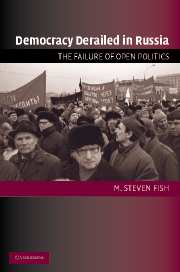Book contents
- Frontmatter
- Contents
- List of Figures and Tables
- Acknowledgments
- Abbreviations
- 1 INTRODUCTION
- 2 SOME CONCEPTS AND THEIR APPLICATION TO RUSSIA
- 3 SYMPTOMS OF THE FAILURE OF DEMOCRACY
- 4 THE RUSSIAN CONDITION IN GLOBAL PERSPECTIVE
- 5 THE STRUCTURAL PROBLEM: GREASE AND GLITTER
- 6 THE POLICY PROBLEM: ECONOMIC STATISM
- 7 THE INSTITUTIONAL PROBLEM: SUPERPRESIDENTIALISM
- 8 CAN DEMOCRACY GET BACK ON TRACK?
- References
- Index
- Titles in the series
- References
References
Published online by Cambridge University Press: 05 September 2012
- Frontmatter
- Contents
- List of Figures and Tables
- Acknowledgments
- Abbreviations
- 1 INTRODUCTION
- 2 SOME CONCEPTS AND THEIR APPLICATION TO RUSSIA
- 3 SYMPTOMS OF THE FAILURE OF DEMOCRACY
- 4 THE RUSSIAN CONDITION IN GLOBAL PERSPECTIVE
- 5 THE STRUCTURAL PROBLEM: GREASE AND GLITTER
- 6 THE POLICY PROBLEM: ECONOMIC STATISM
- 7 THE INSTITUTIONAL PROBLEM: SUPERPRESIDENTIALISM
- 8 CAN DEMOCRACY GET BACK ON TRACK?
- References
- Index
- Titles in the series
- References
- Type
- Chapter
- Information
- Democracy Derailed in RussiaThe Failure of Open Politics, pp. 273 - 302Publisher: Cambridge University PressPrint publication year: 2005



